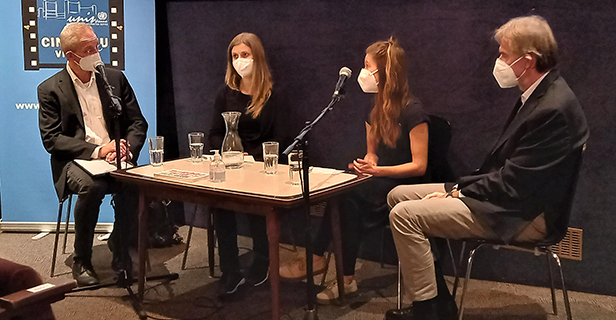
On Monday, 20 September 2021, Ciné-ONU Vienna celebrated its return to in-person screenings at Top Kino with a documentary focusing on how the fashion industry contributes to river pollution and environmental destruction. Due to the Covid-19 pandemic, Ciné-ONU Vienna screenings have been taking place online for more than seventeen months.
This remarkable documentary explores the pollution of our rivers and the environmental consequences of fast fashion, but also shows innovative solutions for a sustainable future. Many rivers have been contaminated due to the disposal of toxic chemicals that are used during manufacturing processes of fast fashion items. Many of these rivers are so polluted, that there is no more life under water. This is devastating for those who rely on these waters for their livelihood. At the same time, ‘RiverBlue’ showcases that manufacturers from Italy and Spain have found innovative ways to produce garments without destroying our environment. So, the documentary illustrates that more sustainable clothing production is possible.
Addressing the issue of pollution by the fashion industry is a crucial to step towards achieving the Sustainable Development Goals since ensuring “clean water and sanitation” (Goal 6), “sustainable consumption and production patterns” (Goal 12) are important elements of the 2030 Agenda for Sustainable Development.
The Ciné-ONU Vienna film screening was organized by the United Nations Information Service (UNIS) Vienna in cooperation with the International Commission for the Protection of the Danube River (ICPDR), this human world film festival and Top Kino. The screening was followed by a discussion with panellists Ivan Zavadsky, Executive Secretary of ICPDR, Stefanie Erhartmaier, Co-Head of the Fashion Department at WeFair, and Lisa Panhuber, Consumer Campaigner from Greenpeace Austria. The debate was moderated by UNIS Director Martin Nesirky. Before the screening, a video message from Roberta Annan, a UN Environment Goodwill Ambassador and Supporter on creative Economy in Africa and an award-winning businesswoman, was shown.
During the debate, Zavadsky stated that the issue of river pollution is “tremendously important”, adding that “we are all responsible for it, that is the message”. He also echoed that this is not an insurmountable challenge, but one that can be addressed through regulations and combined efforts: “ICPDR showed that if there is an effort from all layers of society to clean the river, it is possible.” He mentioned the Danube river basin as an example, which through concerted international action has reduced the levels of pollution.
Moreover, Erhartmaier noted that the fashion industry contributes to “destroying and sacrificing of so many people and animals”. She called for change on various levels: “We need more policies, we need stronger laws and regulations, but also a change coming from the consumers.” She also stressed that: “Owners of the factories need to be held accountable for what is happening in the whole supply chain.”
Panhuber addressed the issue of waste as a result of consumers’ shopping habits. She indicated that a change is necessary when it comes to this issue: “Consumers don’t just wake up one morning and think ‘Oh, I need five new pair of jeans’ - the problem also lies in advertising.”
Both Panhuber and Erhartmaier emphasized the problem of “greenwashing”. This term refers to the presentation of garments as “green” or “sustainable” by major fashion brands. Most of the time, this is either not true, or only partially true, which is why it is important to be careful when buying new clothes. Additionally, consumers should not be afraid to ask how and where the garments are being produced.
All panellists agreed that a lot more effort is necessary to adequately address river pollution by the fashion industry. They also highlighted that consumers are not solely responsible for overcoming this challenge and that governments need to introduce regulations to make sure the issue is taken seriously.